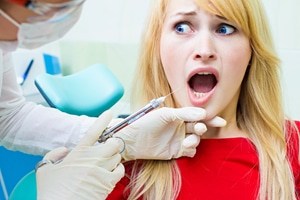A new survey conducted by Public Policy Polling suggests that the average American voter favors getting a root canal over supporting Congress.1 While the survey found that people had a higher opinion of many things over Congress, including cockroaches, Donald Trump and NFL replacement refs, root canals were a surprise for many in the dental community, considering a significant portion of the population suffers from dental anxiety or phobia. The fear of going to the dentist is estimated to affect 9 to 15 percent of the population.2 The real danger of dental phobia is that it often encourages those suffering from the fear to avoid trips to the dentist, exacerbating problems such as gum disease and tooth decay. Once people that are anxious about scheduling an appointment suffer these oral ailments, an overdue trip to the dentist will likely be lengthier and more extensive, thereby only perpetuating the symptoms of ongoing dental phobia. For dental professionals to successfully ensure the oral health of their many patients, they should be aware of the symptoms and causes of dental phobia.
new survey conducted by Public Policy Polling suggests that the average American voter favors getting a root canal over supporting Congress.1 While the survey found that people had a higher opinion of many things over Congress, including cockroaches, Donald Trump and NFL replacement refs, root canals were a surprise for many in the dental community, considering a significant portion of the population suffers from dental anxiety or phobia. The fear of going to the dentist is estimated to affect 9 to 15 percent of the population.2 The real danger of dental phobia is that it often encourages those suffering from the fear to avoid trips to the dentist, exacerbating problems such as gum disease and tooth decay. Once people that are anxious about scheduling an appointment suffer these oral ailments, an overdue trip to the dentist will likely be lengthier and more extensive, thereby only perpetuating the symptoms of ongoing dental phobia. For dental professionals to successfully ensure the oral health of their many patients, they should be aware of the symptoms and causes of dental phobia.
Dental phobia
Dental phobia is a potent fear that makes many people avoid the dentist as much as possible. According to Colgate Oral and Dental Health Resource Center, 30 to 40 million Americans dodge trips to the dentists office due to fear.3 Most dental procedures, such as cleanings, are relatively painless. However, pain, discomfort and helplessness are often cited as reasons those with dental phobia shy away from regularly seeing a dentist. Dental professionals should be on the look out for patients that exhibit signs of fear or nervousness, and make sure to make appointments with these patients as painless as possible.
Causes
There are a number of causes of dental phobia. It’s important to remember that each patient is different and that they may fear the dentist for a variety of reasons. Certain dental procedures can be painful or feel invasive, making patients hesitant to schedule their next visit. Others might be embarrassed about tooth discoloration or other oral aesthetic problems. Some patients might simply not like sitting still.4 The most common causes of dental phobia include: Prior negative experiences Patients who have sat through painful and uncomfortable dental visits might develop a fear of returning. This might be especially true for adults who had problems with cavities or braces as children, or who’s first experiences at the dentist’s office came prior to “pain-free” dentistry.5 Embarrassment Many people are very self-conscious about their appearance. At times society puts a lot of emphasis on having a nice smile, so some patients might be embarrassed if their teeth don’t look the way they’d like them to. Pain This fear can often seem irrational considering the level of pain experienced by most people during a normal dental checkup is pretty low. However, patients experiencing dental phobia might have a lower pain tolerance or imagine pain due to being stressed out by the situation. Helplessness Sitting in the dentist’s chair can cause anxiety for some patients because it is an experience out of their control. The mouth is an intimate part of the body, and sitting while a hygienist and dentist clean or inspect the mouth can make some people feel helpless.
Signs that a patient may be experiencing dental phobia
There are a number of signs that might mean a patient is exhibiting dental phobia. Of course, one sign is when patients avoid appointments or find last minute reasons to cancel. If patients appear nervous or nauseated in the waiting room, that can be another sign. In some cases, patients can actually get physically ill or experience mild panic attacks. Dental professionals should stay on the look out for these signs to ensure the most comfortable and relaxing visits for their patients. 1“Congress less popular than cockroaches, traffic jams” Public Policy Polling. http://www.publicpolicypolling.com/main/2013/01/congress-less-popular-than-cockroaches-traffic-jams.html 2“What is Dental Anxiety and Phobia?” Colgate Oral and Dental Health Resource Center. September 18, 2013. http://www.colgate.com/app/CP/US/EN/OC/Information/Articles/Oral-and-Dental-Health-Basics/Checkups-and-Dental-Procedures/The-Dental-Visit/article/What-is-Dental-Anxiety-and-Phobia.cvsp#Symptoms 3“What is Dental Anxiety and Phobia?” Colgate Oral and Dental Health Resource Center. September 18, 2013. http://www.colgate.com/app/CP/US/EN/OC/Information/Articles/Oral-and-Dental-Health-Basics/Checkups-and-Dental-Procedures/The-Dental-Visit/article/What-is-Dental-Anxiety-and-Phobia.cvsp#Symptoms 4“What is Dental Anxiety and Phobia?” Colgate Oral and Dental Health Resource Center. September 18, 2013. http://www.colgate.com/app/CP/US/EN/OC/Information/Articles/Oral-and-Dental-Health-Basics/Checkups-and-Dental-Procedures/The-Dental-Visit/aricle/What-is-Dental-Anxiety-and-Phobia.cvsp#Symptoms 5“What is Dental Anxiety and Phobia?” Colgate Oral and Dental Health Resource Center. September 18, 2013. http://www.colgate.com/app/CP/US/EN/OC/Information/Articles/Oral-and-Dental-Health-Basics/Checkups-and-Dental-Procedures/The-Dental-Visit/article/What-is-Dental-Anxiety-and-Phobia.cvsp#Symptoms



